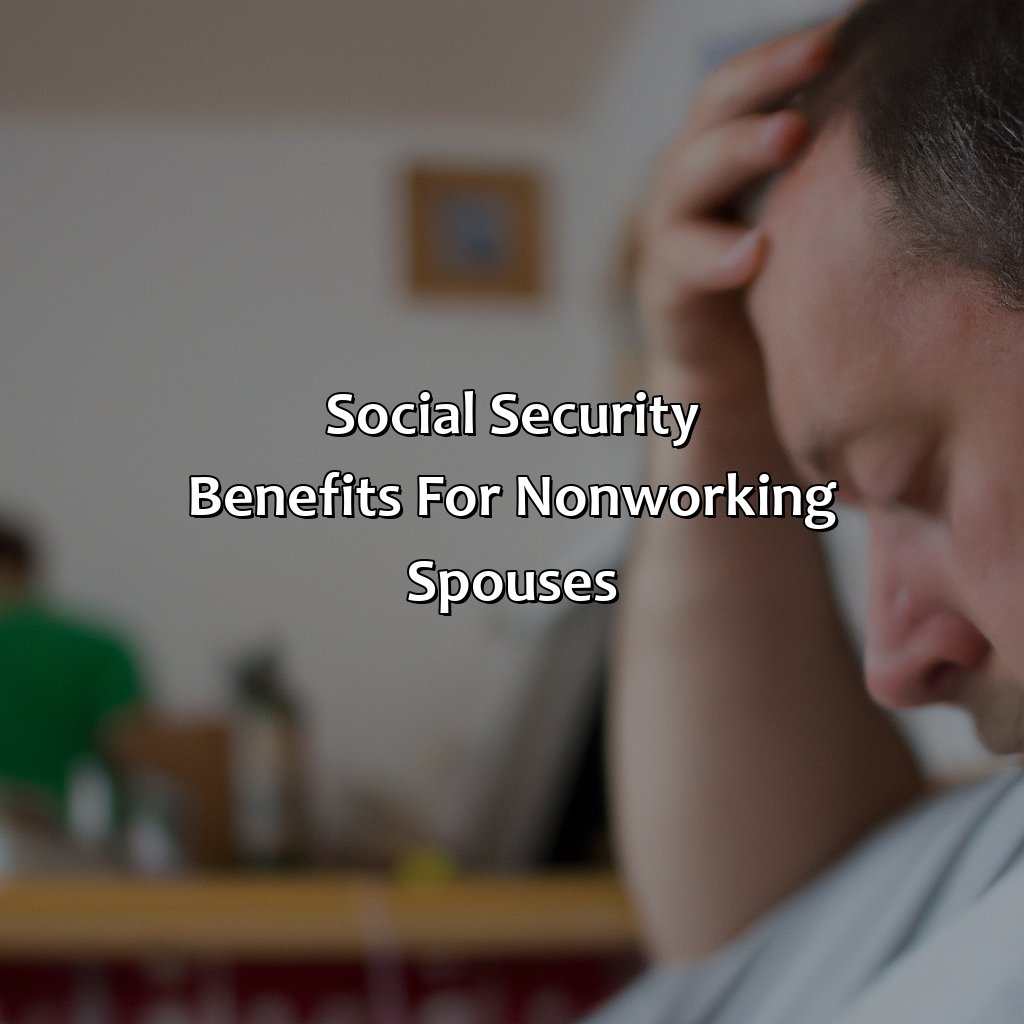How Much Social Security Does A Non Working Spouse Get?
Key Takeaway:
- Eligibility Requirements: To be eligible for social security benefits as a non-working spouse, the individual must be at least 62 years old, must be married to someone who is eligible for Social Security benefits, and have been married for at least one year.
- Calculation of Benefits: The amount of benefits a non-working spouse is entitled to receive is up to 50% of the working spouse’s benefit amount. The actual amount received may be affected by factors such as when the non-working spouse starts receiving benefits and if they have other sources of income.
- Restrictions on Benefits: Non-working spouses may be subject to restrictions on their benefits, such as the Government Pension Offset (GPO) or Supplemental Security Income (SSI) if they receive other government benefits or have not contributed enough to Social Security through their own work history.
Are you a non working spouse concerned about securing your Social Security benefits? Discover how much you are eligible to receive in this helpful guide. You can easily learn how to maximize your Social Security benefits.
Social Security Benefits for Non-Working Spouses
Do you or your spouse need Social Security Benefits? To find out, you must consider the Eligibility Requirements and Benefits Calculation. These sub-sections can help you out. They will explain how to evaluate if you or your spouse are eligible and how to calculate benefits.

Image credits: retiregenz.com by Adam Arnold
Eligibility Requirements
To qualify for Social Security Benefits as a non-working spouse, you must be married to someone who qualifies for Social Security Benefits and must be at least 62 years old. You can also claim benefits if your spouse is currently receiving disability or retirement benefits.
Additionally, you must have been married to your spouse for at least one year and not currently married to anyone else. If you are divorced but were married for more than ten years, you may still be eligible to receive benefits based on your ex-spouse’s earnings record.
It’s worth noting that even if you meet these eligibility requirements, the amount of benefit you receive will depend on various factors, such as your spouse’s work history and when you choose to start receiving benefits.
An example of this is illustrated by Susan, whose husband has retired and started collecting his Social Security Benefits. Susan does not have any work history of her own and is eligible to receive a spousal benefit. However, she decides to delay receiving it until she reaches full retirement age to increase the amount she will receive each month.
Get your calculators ready, because we’re about to figure out just how much money your non-working spouse is worth in social security benefits!
Calculation of Benefits
To determine the amount of Social Security benefits entitled to non-working spouses, specific considerations are taken into account:
- Eligibility depends on the age of the working spouse
- Benefits for a non-working spouse are worth 50% of the earning spouse’s benefit
- You must have been married for at least one year to claim spousal benefits
- Benefits can begin at age 62 but may be reduced if claimed early
- The amount of Social Security earned impacts spousal benefits
- The higher earning spouse’s claiming strategy can affect their spouse’s total benefit amount.
It’s crucial to note that if you’re eligible for both spousal and personal social security benefits- you’ll only receive whichever is better. Furthermore, keep in mind that the calculation of non-working spousal benefits has several nuances depending on individual circumstances.
Don’t miss out on your entitled Social Security benefits as a non-working spouse. Ensure that you’ve understood your eligibility and claim what is yours rightfully.
Why work when you can marry rich and reap the Social Security benefits? Applying for benefits has never been easier!
Applying for Benefits
It’s essential to get the right info when applying for social security benefits for non-working spouses. This section will help! It discusses the various aspects of applying. We’ll look at the documents you need and the pros of applying online or in-person. It all depends on your situation.

Image credits: retiregenz.com by Harry Duncun
Supporting Documents
For the required paperwork, what documentation is necessary for the application process?
In order to apply for social security benefits, certain essential documents are required. We have provided a list of Supporting Documents that need to be submitted with the application form. The table provides detailed information on each document’s purpose and format, making it easier for applicants to prepare their applications.
| Required Document | Purpose | Format |
|---|---|---|
| Birth Certificate | Proves the applicant’s identity and age | Original or Copy |
| Social Security Card | Verifies if the applicant has an SSN | Original or Copy |
| Marriage License | Certified by authorities to determine spousal status | Original or Copy |
| Death Certificate | Proves that applicant’s spouse is deceased | Original or Copy |
| Tax Returns | Shows monthly income of both spouses for assessment | Original or Copy |
It’s worth noting that providing false details on any of these documents may result in a rejection of your social security benefit application. Ensure that you provide accurate information.
Applicants who possess some but not all of these supporting materials should still submit their incomplete applications. Nonetheless, this may cause considerable delays in the processing time as our team verifies and collects missing documentation directly from various sources.
In recent years, fraud has been detected, resulting in many individuals’ benefits being frozen while undergoing additional scrutiny. Fraud occurrence has necessitated a stricter approach toward verifying candidates’ claims throughout their application process. To ensure timely and efficient processing, it is recommended that applicants submit all necessary documents and precise information related to them while applying for social security benefits.
Applying for benefits is like choosing between online dating or meeting someone in person – both have their risks and rewards.
Applying Online or In-Person
The process of initiating Social Security benefits can be done either via the internet or through in-person interaction. The online submission route is more preferred, as it saves time and effort compared to taking the traditional way to a physical office. Both mediums offer the same benefit amount for a non-working spouse based on their spouse’s earnings credit records.
Furthermore, when submitting your application online, you must ensure that your account is set up before initiating the retirement or spousal claim form. The information required on these digital platforms includes social security numbers, pay history details of both spouses and the marriage dates of spouses.
It is also noteworthy that scheduling an appointment with a Social Security representative requires a phone call if online submission proves challenging. Finally, social security authority prefers applicants electronic filing of claims over physical submissions since they are faster and less prone to errors during processing.
In summary, when preparing to make social security claims for non-working spouses based on their partner’s earning credits records, one has the option to do so via online channels or traditional ways. An effortless online submission process could prove worthwhile for individuals seeking streamlined application procedures and quicker approval times.
A true story worth sharing involves an older couple who made their claim at the Social Security Administration office located miles away from their residence. They opted for this outdated method despite having grandchildren who could have helped them apply online conveniently. Avoid unnecessary inconveniences by using the available resources offered by modernity today; apply efficiently and with ease via online portals.
Looks like getting benefits is easier said than funded.
Restrictions on Benefits
Curious about the benefits restrictions? Check out the “How much Social Security does a nonworking spouse get?” article. It has two subsections:
- One is about Supplemental Security Income (SSI).
- The other is about Government Pension Offset (GPO).
These can help those with retirement pensions or low income. They provide solutions to the limits of social security benefits.

Image credits: retiregenz.com by Joel Washington
Supplemental Security Income (SSI)
Supplemental Security Income (SSI) is a government program aimed at providing financial assistance to disabled or elderly individuals with limited income and resources. This benefit program helps recipients pay for their daily living expenses, including food, shelter, and clothing.
The amount of SSI benefits received by an individual depends on various factors, including the individual’s income, assets, and living arrangements. The maximum federal SSI payment for 2022 is $794 per month for an eligible single person or $1,191 per month for an eligible couple.
Additionally, certain states may offer additional monthly payments to SSI recipients. These payments are known as state supplementary payments and are intended to cover the difference between the federal SSI payment and the minimum amount necessary to meet basic needs in a particular state.
Pro Tip: It is important to keep in mind that SSI benefits are generally not taxable, but eligibility requirements can vary depending on individual circumstances. Seeking guidance from a qualified professional can help ensure that you receive all the benefits you are entitled to under the law.
If you thought being married meant you got a free pass to government benefits, think again- the GPO is here to remind you that nothing in life is truly free.
Government Pension Offset (GPO)
Social Security imposes a government pension offset (GPO) on people who receive pensions from work not covered by the Social Security system. The GPO is applied to spousal or survivor benefits. The amount received in non-covered employment decreases future social security spouse or survivor benefits by two-thirds of the pension amount received.
The GPO can significantly affect the benefits available to non-working spouses. The reduction may apply even if a spouse was exempt from paying Social Security taxes and thus earned no credits towards Social Security benefits. These restrictions exist because Social Security aims to provide fair and adequate coverage for all workers, including those who have not paid into the system via covered employment.
It’s essential to note that some states offer Public Employee Retirement System (PERS) programs. These are separate retirement programs that do not follow Social Security guidelines and may be an option for employees who want their full retirement benefits but also want job stability.
A woman named Jane recently learned about the GPO when her husband began receiving his cherished military pension, which made her ineligible for spousal survivor benefits. Although she had never worked herself, she had always counted on receiving this benefit to support herself after her husband’s death. In the end, Jane realized that planning and evaluating her options ahead of time could have prevented any surprises when the time comes to retire.
Five Facts About How Much Social Security Does a Non-Working Spouse Get:
A non-working spouse can receive up to 50% of the working spouse’s Social Security benefit. (Source: Investopedia)
The non-working spouse must be at least 62 years old to receive Social Security benefits. (Source: Social Security Administration)
If the working spouse delays claiming Social Security benefits until age 70, the non-working spouse can receive a higher percentage of the Social Security benefit. (Source: Kiplinger)
There is a limit on the total amount of Social Security benefits a household can receive, including benefits for non-working spouses. (Source: Social Security Administration)
The non-working spouse can receive Social Security benefits even if they have never worked or paid into the Social Security system. (Source: AARP)
FAQs about How Much Social Security Does A Non Working Spouse Get?
1. How much social security does a non working spouse get?
A non working spouse can receive up to half of the working spouse’s social security benefit. This is known as a spousal benefit. The amount can vary depending on factors such as the working spouse’s earnings and retirement age.
2. Is there a minimum social security benefit for non working spouses?
Yes, non working spouses are guaranteed a minimum benefit of 50% of the working spouse’s full retirement benefit.
3. Can a non working spouse receive social security benefits before their working spouse retires?
Yes, a non working spouse can receive spousal benefits as early as age 62, as long as the working spouse has already started receiving their own social security benefits.
4. Will a non working spouse’s social security benefit affect their working spouse’s benefit?
No, a non working spouse’s social security benefit will not affect their working spouse’s own benefit amount.
5. Can a non working spouse receive social security benefits if they have never worked?
Yes, a non working spouse can receive social security benefits based on their spouse’s work history.
6. What happens to a non working spouse’s social security benefit when their working spouse dies?
If the working spouse passes away, the non working spouse becomes eligible for survivor benefits, which can be up to 100% of the deceased spouse’s benefit amount.
 Checkout this IRS Loophole
Checkout this IRS Loophole 
